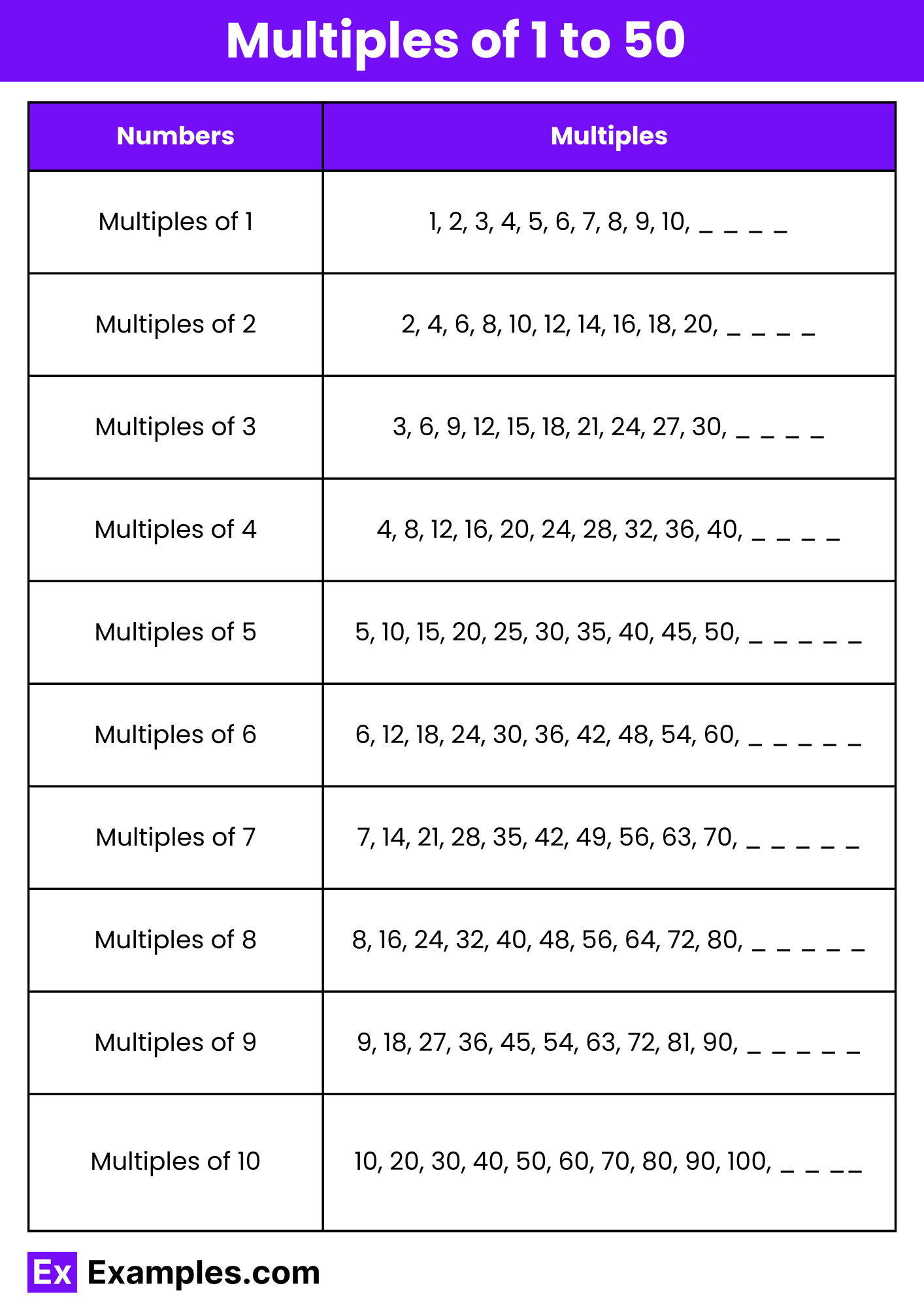What is the smallest multiple of 20 that is greater than 50?
40
60
80
100


Understanding the multiples of numbers from 1 to 50 is fundamental in mathematics, serving as a building block for various arithmetic and algebraic concepts. Multiples are the result of multiplying a number by an integer, providing insight into patterns and relationships between numbers. For example, the multiples of 2 (2, 4, 6, 8, …) and 5 (5, 10, 15, 20, …) show regular intervals and can help in identifying common multiples, least common multiples (LCM), and factors. Recognizing these multiples aids in simplifying fractions, solving equations, and working with sequences and series. This knowledge is essential for students as it underpins more complex mathematical operations and problem-solving strategies. In this guide, we’ll explore the multiples of each number from 1 to 50, highlighting their significance and practical applications.
Download Multiples of 1 to 50 in PDF

Download Multiples of 1 to 50 in PDF
| Numbers | Multiples |
|---|---|
| Multiples of 1 | 1, 2, 3, 4, 5, 6, 7, 8, 9, 10, _ _ _ _ _ |
| Multiples of 2 | 2, 4, 6, 8, 10, 12, 14, 16, 18, 20, _ _ _ _ _ |
| Multiples of 3 | 3, 6, 9, 12, 15, 18, 21, 24, 27, 30, _ _ _ _ _ |
| Multiples of 4 | 4, 8, 12, 16, 20, 24, 28, 32, 36, 40, _ _ _ _ _ |
| Multiples of 5 | 5, 10, 15, 20, 25, 30, 35, 40, 45, 50, _ _ _ _ _ |
| Multiples of 6 | 6, 12, 18, 24, 30, 36, 42, 48, 54, 60, _ _ _ _ _ |
| Multiples of 7 | 7, 14, 21, 28, 35, 42, 49, 56, 63, 70, _ _ _ _ _ |
| Multiples of 8 | 8, 16, 24, 32, 40, 48, 56, 64, 72, 80, _ _ _ _ _ |
| Multiples of 9 | 9, 18, 27, 36, 45, 54, 63, 72, 81, 90, _ _ _ _ _ |
| Multiples of 10 | 10, 20, 30, 40, 50, 60, 70, 80, 90, 100, _ _ _ _ _ |
| Multiples of 11 | 11, 22, 33, 44, 55, 66, 77, 88, 99, 110, _ _ _ _ _ |
| Multiples of 12 | 12, 24, 36, 48, 60, 72, 84, 96, 108, 120, _ _ _ _ _ |
| Multiples of 13 | 13, 26, 39, 52, 65, 78, 91, 104, 117, 130, _ _ _ _ _ |
| Multiples of 14 | 14, 28, 42, 56, 70, 84, 98, 112, 126, 140, _ _ _ _ _ |
| Multiples of 15 | 15, 30, 45, 60, 75, 90, 105, 120, 135, 150, _ _ _ _ _ |
| Multiples of 16 | 16, 32, 48, 64, 80, 96, 112, 128, 144, 160, _ _ _ _ _ |
| Multiples of 17 | 17, 34, 51, 68, 85, 102, 119, 136, 153, 170, _ _ _ _ _ |
| Multiples of 18 | 18, 36, 54, 72, 90, 108, 126, 144, 162, 180, _ _ _ _ _ |
| Multiples of 19 | 19, 38, 57, 76, 95, 114, 133, 152, 171, 190, _ _ _ _ _ |
| Multiples of 20 | 20, 40, 60, 80, 100, 120, 140, 160, 180, 200, _ _ _ _ _ |
| Multiples of 21 | 21, 42, 63, 84, 105, 126, 147, 168, 189, 210, _ _ _ _ _ |
| Multiples of 22 | 22, 44, 66, 88, 110, 132, 154, 176, 198, 220, _ _ _ _ _ |
| Multiples of 23 | 23, 46, 69, 92, 115, 138, 161, 184, 207, 230, _ _ _ _ _ |
| Multiples of 24 | 24, 48, 72, 96, 120, 144, 168, 192, 216, 240, _ _ _ _ _ |
| Multiples of 25 | 25, 50, 75, 100, 125, 150, 175, 200, 225, 250, _ _ _ _ _ |
| Multiples of 26 | 26, 52, 78, 104, 130, 156, 182, 208, 234, 260, _ _ _ _ _ |
| Multiples of 27 | 27, 54, 81, 108, 135, 162, 189, 216, 243, 270, _ _ _ _ _ |
| Multiples of 28 | 28, 56, 84, 112, 140, 168, 196, 224, 252, 280, _ _ _ _ _ |
| Multiples of 29 | 29, 58, 87, 116, 145, 174, 203, 232, 261, 290, _ _ _ _ _ |
| Multiples of 30 | 30, 60, 90, 120, 150, 180, 210, 240, 270, 300, _ _ _ _ _ |
| Multiples of 31 | 31, 62, 93, 124, 155, 186, 217, 248, 279, 310, _ _ _ _ _ |
| Multiples of 32 | 32, 64, 96, 128, 160, 192, 224, 256, 288, 320, _ _ _ _ _ |
| Multiples of 33 | 33, 66, 99, 132, 165, 198, 231, 264, 297, 330, _ _ _ _ _ |
| Multiples of 34 | 34, 68, 102, 136, 170, 204, 238, 272, 306, 340, _ _ _ _ _ |
| Multiples of 35 | 35, 70, 105, 140, 175, 210, 245, 280, 315, 350, _ _ _ _ _ |
| Multiples of 36 | 36, 72, 108, 144, 180, 216, 252, 288, 324, 360, _ _ _ _ _ |
| Multiples of 37 | 37, 74, 111, 148, 185, 222, 259, 296, 333, 370, _ _ _ _ _ |
| Multiples of 38 | 38, 76, 114, 152, 190, 228, 266, 304, 342, 380, _ _ _ _ _ |
| Multiples of 39 | 39, 78, 117, 156, 195, 234, 273, 312, 351, 390, _ _ _ _ _ |
| Multiples of 40 | 40, 80, 120, 160, 200, 240, 280, 320, 360, 400, _ _ _ _ _ |
| Multiples of 41 | 41, 82, 123, 164, 205, 246, 287, 328, 369, 410, _ _ _ _ _ |
| Multiples of 42 | 42, 84, 126, 168, 210, 252, 294, 336, 378, 420, _ _ _ _ _ |
| Multiples of 43 | 43, 86, 129, 172, 215, 258, 301, 344, 387, 430, _ _ _ _ _ |
| Multiples of 44 | 44, 88, 132, 176, 220, 264, 308, 352, 396, 440, _ _ _ _ _ |
| Multiples of 45 | 45, 90, 135, 180, 225, 270, 315, 360, 405, 450, _ _ _ _ _ |
| Multiples of 46 | 46, 92, 138, 184, 230, 276, 322, 368, 414, 460, _ _ _ _ _ |
| Multiples of 47 | 47, 94, 141, 188, 235, 282, 329, 376, 423, 470, _ _ _ _ _ |
| Multiples of 48 | 48, 96, 144, 192, 240, 288, 336, 384, 432, 480, _ _ _ _ _ |
| Multiples of 49 | 49, 98, 147, 196, 245, 294, 343, 392, 441, 490, _ _ _ _ _ |
| Multiples of 50 | 50, 100, 150, 200, 250, 300, 350, 400, 450, 500, _ _ _ _ _ |
Examining the multiples of numbers from 1 to 50 reveals fundamental patterns in arithmetic and number theory. Each number in this range produces a unique set of multiples, highlighting its role in various mathematical operations. For instance, the multiples of smaller numbers like 1, 2, and 3 form the building blocks for all integers, while larger numbers like 49 and 50 have fewer multiples within a given range but play significant roles in more complex calculations. Understanding these multiples is crucial for identifying common multiples, finding least common multiples (LCM), and solving real-world problems involving ratios, proportions, and divisibility. This exploration underscores the importance of basic multiplication in both elementary and advanced mathematics.
Text prompt
Add Tone
10 Examples of Public speaking
20 Examples of Gas lighting
What is the smallest multiple of 20 that is greater than 50?
40
60
80
100
Which number is a multiple of 25?
75
80
85
90
What is the common multiple of 20 and 30?
40
60
80
90
Which of the following numbers is a multiple of 40?
100
110
120
130
What is the result when you subtract the largest multiple of 25 that is less than 100 from 100?
25
50
75
100
What is the next multiple of 30 after 90?
100
120
150
180
Which number is not a multiple of 20?
80
100
130
140
What is the multiple of 25 that is closest to 60?
50
75
100
125
What is the least common multiple of 20 and 50?
50
100
150
200
Which of the following is not a multiple of 40?
80
120
150
160
Before you leave, take our quick quiz to enhance your learning!

